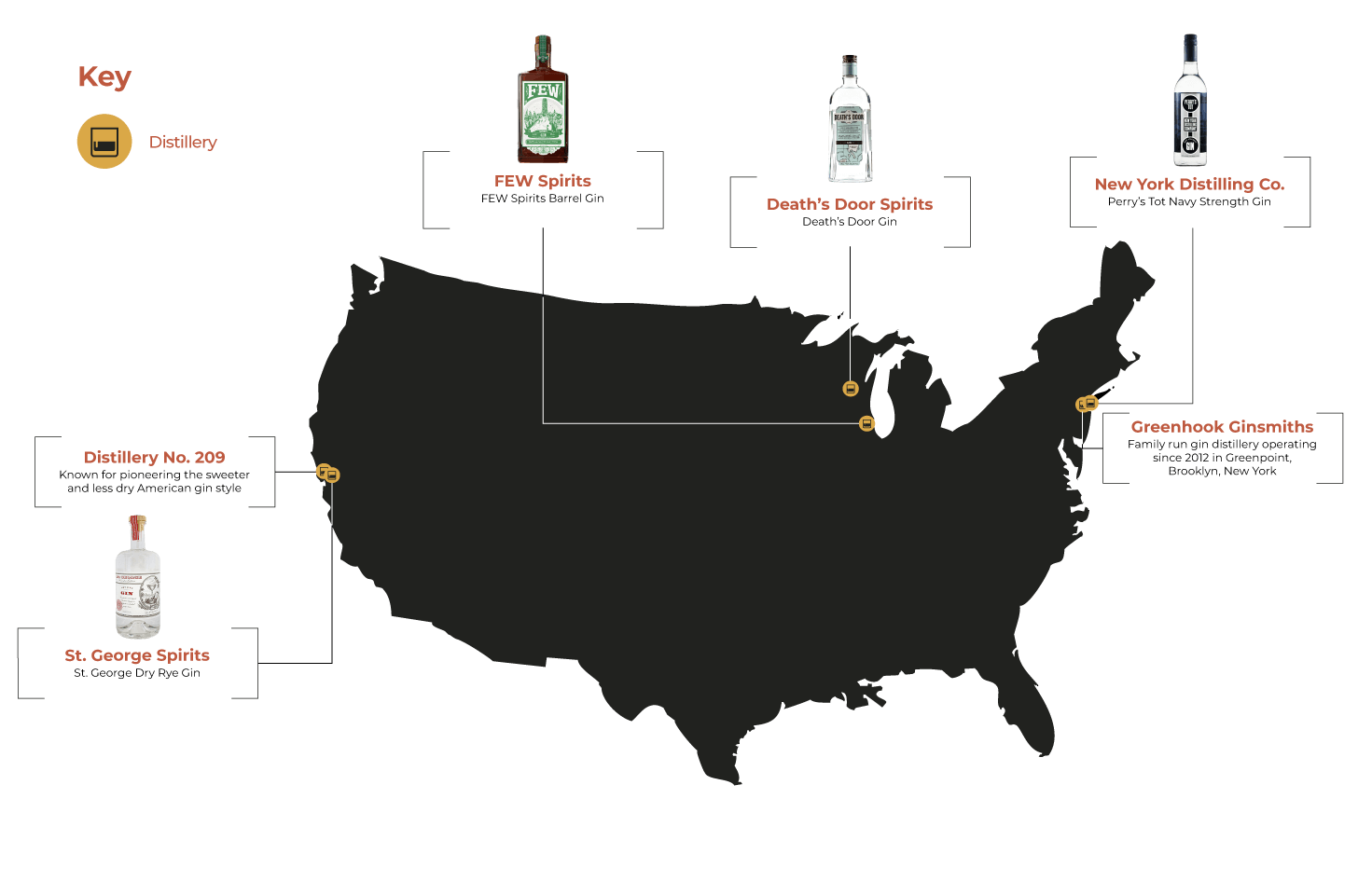American gin-making is still largely craft-focused thanks to the overwhelmingly dominant American whiskey industry.
Even though whiskey retains the top spot in the minds and wallets of American consumers, there has been an explosion in demand for imported British London dry style gin, leading many American distilleries to start experimenting with their own twist on artisanal gin-making.
American distillers have a strong preference for crafting gins that focus on flavours other than juniper, although the botanical is still included, as is required by law, leading to the creation of a completely new style of gin called the “New Western” or “New American Gin”.
Whilst still retaining the use of juniper, American distillers use a number of botanicals that make for a more “wet”, in other words less dry, or more sweet, tasting experience.
This article offers some further detail on this point. For those who want to venture outside the classical world of London dry gin, America offers gin enthusiasts the chance to explore a different side to the juniper-based spirit.
As the American gin industry is largely focused on small batch craft gins, there are a multitude of small distilleries producing the bulk of the American gins that are commercially available.
With this in mind, some of the notable distilleries to come out of America include Greenhook Ginsmiths Distillery, which produces American favourites like the Greenhook Ginsmiths American Dry Gin, New York Distilling Co, who make the famously strong Perry’s Tot Navy Strength Gin, and Distillery No. 209, responsible for crafting the distinctly American style gin No. 209 Gin.
Whilst these distilleries and bottles represent some of the common mentions when someone first discusses American gin, beneath the surface there are even more uniquely crafted gins emerging across the country.
One such example includes the hauntingly named Death’s Door Gin, crafted by Death’s Door Spirits, that uses only three botanicals in such a way that the often off-putting bitter-tasting dryness common amongst other London dry style gins because of their heavy use of juniper is almost non-existent in this bottle.
Looking into American gin distilleries and brands can prove to be a truly new and exciting process for the gin connoisseur as it offers them the chance to venture towards the softer side of gin, outside of the juniper-heavy and bitterly-dry classic London dry gins common in Britain and Europe.
For other options, read this article, which offers up some further recommended American gins to sample, or consider the range of craft gins available online here.
Because American gin, as a general characteristic, represents a step towards the softer side of gin, it is easy to enjoy many of them simply neat, over ice, and garnished with a slice of lemon, lime, cucumber, or orange.
Added to this, the American distillers’ fondness to focus their gins away from juniper, and with the base spirit often being sweeter and softer in texture thanks to it being a mash of corn and wheat, it results in American gin’s being matched with a softer and less bitter style of tonic water that the more traditional Indian tonic water.
American gins also tend to be used in the sweeter style gin cocktails, such as the Bramble or the Bees Knees, due to the characteristically sweeter and softer profiles of the gins.
They can, however, be used in many of the classically dry gin cocktails, including Gin Martini or Negroni, for those wishing to soften these with a less intensely dry or bitter gin.
Pairing food with American gin can appear difficult, however as with all gins, the key to discovering what dishes go well is to look at the botanicals used during distillation.
As an example, the Greenhook Ginsmiths American Dry Gin, which is a softer style dry gin, can be matched well with any fresh salad or light seafood dish, due to the softer flavours imparted by the botanicals used.
By contrast, the Perry’s Tot Navy Strength Gin, which is a far spicier and stronger flavoured drinking experience, would be best paired with a plate of smoked or cured meats, due to the assertive flavours present in the bottle.
Most of us know that gin is made from various botanicals but do you know how they affect the taste? We explore how in this guide.
Looking to spruce up your mixing game? We’ve put together a quick guide on which of the common supermarket mixers work best with some of your favourite spirits.
Noticed some new products at your local bottle shop? At least some of these are bound to be hard seltzers, the latest drinks craze to sweep the nation.

